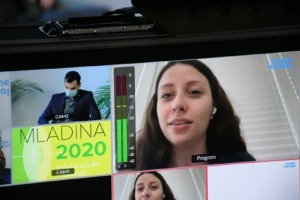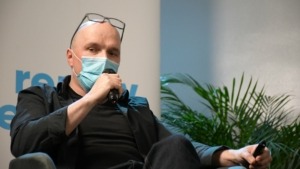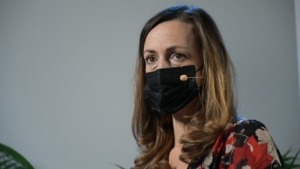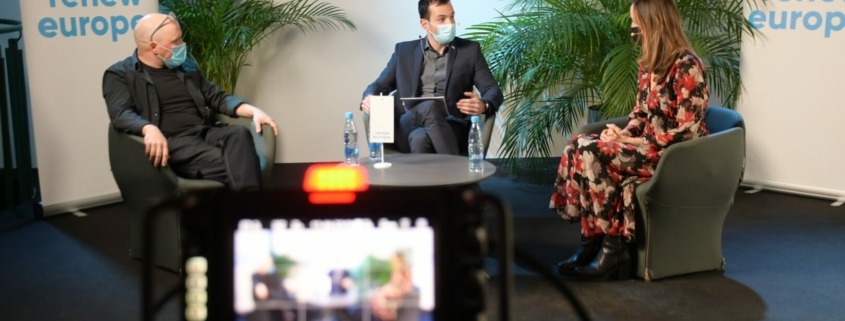Today, MEP Irena Joveva (Renew Europe/LMŠ) hosted a virtual round table on “Mental Health – Issues and Challenges Facing Adolescents”.
In an interesting discussion on this pressing issue of contemporary society Joveva was joined by Maria Soraya Rodríguez Ramos, MEP and Co-Chair of the European Parliaments’ Coalition for Mental Health and Wellbeing and member of the European Parliament’s LGBTI Intergroup, Assist. Prof. Andreja Poljanec, psychologist and psychotherapist, Head of the Psychology Department at the Ljubljana Branch of Sigmund Freud University Vienna, Assoc. Prof. Andrej Naterer, professor of anthropology at the Faculty of Arts, University of Maribor and co-author of the Mladina 2020 (Youth 2020) survey, Klemen Selaković, author of the Slovenian podcast Aidea, where he meets and communicates with many young people; Marjan Šarec, Deputy and President of the LMŠ party, and Aljaž Kovačič, LMŠ Deputy who also moderated the event.
Marjan Šarec began by stressing the importance of the mental health of young people, who were already subjected to many pressures even before the epidemic: “The LMŠ is certainly not oblivious to this. Rather, our party’s political programme sets out the goal to regulate the mental health sector in a systemic manner. This means that it should be governed by appropriate legislation and that a mental health service or office should be set up in the relevant ministry.”
 Similarly, Irena Joveva focuses most of her work on young people, who, she says, are equal, fully-fledged and indispensable members of a developed and modern society and deserve to be treated as such. “There are more and more young people who regularly experience loneliness and stress. Experts point in particular to stress-related disorders such as anxiety and depression, but also to eating disorders, anxiety disorders and behavioural and emotional disorders. The pandemic and the measures taken as a result of it merely compound all of them,” she said, also mentioning the impact and pressure from parents and social networks. As a shadow rapporteur on behalf of Renew Europe, Joveva will contribute to the report on the impact of COVID-19 closures of educational, cultural, youth and sports activities on children and young people in the EU, and make sure it includes the need to provide timely help to young people in mental distress and to improve society’s awareness of mental health issues.
Similarly, Irena Joveva focuses most of her work on young people, who, she says, are equal, fully-fledged and indispensable members of a developed and modern society and deserve to be treated as such. “There are more and more young people who regularly experience loneliness and stress. Experts point in particular to stress-related disorders such as anxiety and depression, but also to eating disorders, anxiety disorders and behavioural and emotional disorders. The pandemic and the measures taken as a result of it merely compound all of them,” she said, also mentioning the impact and pressure from parents and social networks. As a shadow rapporteur on behalf of Renew Europe, Joveva will contribute to the report on the impact of COVID-19 closures of educational, cultural, youth and sports activities on children and young people in the EU, and make sure it includes the need to provide timely help to young people in mental distress and to improve society’s awareness of mental health issues.
Soraya Rodríguez Ramos highlighted, among other things, the most extreme manifestation of mental health disorders that we have seen in recent months ̶ suicide among young people. “It is heartbreaking that every year in Europe, 1,200 children and adolescents aged between 10 and 19 take their own lives, which is the equivalent of three young people every day. It is imperative that we attend to young people’s mental health from their earliest years and in the settings where they spend most of their time. Schools can serve as platforms that help to raise awareness of specific illnesses and fight the stigma and bullying that continues to surround them,” she said, outlining a range of actions that Renew Europe is working on to address young people’s mental health, including digital solutions and online counselling.
 Andrej Naterer presented the results of the Youth 2020 survey, which revealed worrying trends: “Stress among young people has more than doubled, young people say they feel it most days. The proportion of young people who are lonely has tripled. COVID has contributed to loneliness, but not significantly, as loneliness was already increasing before COVID and will persist and increase once the pandemic is over. And there is also a growing presence of anxiety among young people.”
Andrej Naterer presented the results of the Youth 2020 survey, which revealed worrying trends: “Stress among young people has more than doubled, young people say they feel it most days. The proportion of young people who are lonely has tripled. COVID has contributed to loneliness, but not significantly, as loneliness was already increasing before COVID and will persist and increase once the pandemic is over. And there is also a growing presence of anxiety among young people.”
Andreja Poljanec mentioned the distorted expectations and experience of maturity, as 18-year-olds tend not to be as mentally mature as their physical appearance might suggest: “As adults, we too often neglect the needs of young people because we experience them as too insignificant to deal with, when in fact the neurological stress response in young people is greater because of this overall immaturity.” It is important that adults listen to young people and gain their trust. “The fact that there is so much depression means that young people are losing hope for the future,” she added. She and Aljaž Kovačič mentioned the modern trend of parents’ high expectations, which later manifest themselves as anxieties in children.
Klemen Selakovič spoke about the fact that in today’s world, change is greater and faster. “It is becoming more and more difficult for adults to understand young people and young people feel it. I would agree – the world expects a lot from us, but in reality, we expect a lot from ourselves, and I feel the same myself. I constantly get cues as to what I should be and what I should have.” He sees the solution in changing the social values that influence young people. “We need to move away from performance metrics and ask ourselves if these are really the goals we should pursue in life,” he summed up.
 Andreja Poljanec also touched on the aspect of environment and peers, as being close to family and friends goes a long way towards adolescents not developing mental disorders. She would like to see changes in the curricula at all levels of education and that those who work professionally with young people would be equipped with the modern knowledge and skills needed for working with young people. Andrej Naterer also mentioned research showing that our sensitivity to stress has increased, while at the same time societal pressures are mounting. Activities that worked against stress in the past now add to it: “They, too, have a competitive element nowadays. If you do sport, there’s always someone better, if you do yoga, there’s always someone doing more asanas.” The findings show that good family relationships are the first line of defence, followed by good relationships within the extended family, in the neighbourhood and with friends. It is the spread of egoistic behaviours that we have been witnessing in recent years that is tearing us apart and increasing stress. The solution lies in improving relationships and in consciously withdrawing from stress-inducing impulses, including constant online presence. Klemen Selaković confirmed that depression is a disease of difficult personal relationships, but also stressed the importance of one’s own engagement: “One has to ask oneself if it really is the parents, mother, capitalism who are to blame for everything? If you believe that, then you are not taking responsibility for your own life.”
Andreja Poljanec also touched on the aspect of environment and peers, as being close to family and friends goes a long way towards adolescents not developing mental disorders. She would like to see changes in the curricula at all levels of education and that those who work professionally with young people would be equipped with the modern knowledge and skills needed for working with young people. Andrej Naterer also mentioned research showing that our sensitivity to stress has increased, while at the same time societal pressures are mounting. Activities that worked against stress in the past now add to it: “They, too, have a competitive element nowadays. If you do sport, there’s always someone better, if you do yoga, there’s always someone doing more asanas.” The findings show that good family relationships are the first line of defence, followed by good relationships within the extended family, in the neighbourhood and with friends. It is the spread of egoistic behaviours that we have been witnessing in recent years that is tearing us apart and increasing stress. The solution lies in improving relationships and in consciously withdrawing from stress-inducing impulses, including constant online presence. Klemen Selaković confirmed that depression is a disease of difficult personal relationships, but also stressed the importance of one’s own engagement: “One has to ask oneself if it really is the parents, mother, capitalism who are to blame for everything? If you believe that, then you are not taking responsibility for your own life.”
Photo: Matej Špehar





Leave a Reply
Want to join the discussion?Feel free to contribute!